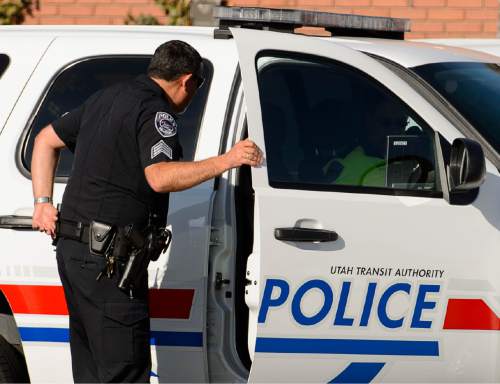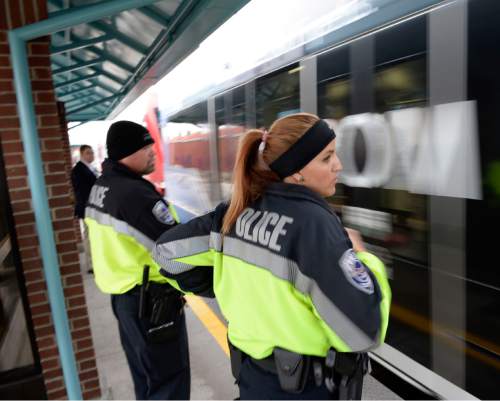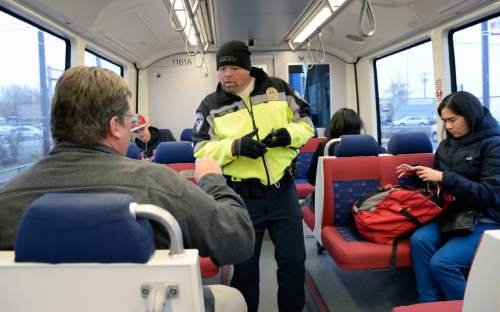This is an archived article that was published on sltrib.com in 2014, and information in the article may be outdated. It is provided only for personal research purposes and may not be reprinted.
Utah Transit Authority officials have decided it is wise for the agency to keep its own police force — but supplement it with cheaper, unarmed, non-police "fare-enforcement officers" to help crack down on fare evaders.
The move comes after two years of controversy. When Draper Mayor Troy Walker joined the UTA board last year, he questioned whether the agency could save money or improve service by disbanding its police and contracting instead with another force.
UTA administrators responded with a study saying their department operates more cheaply than most transit agencies nationally that contract with other police agencies.
But Walker pushed for and obtained a $50,000 study by an outside consultant to verify that — and look for any advantages to contracting. He traveled with consultants to three cities to examine transit agencies that operate somewhat differently.
They included Los Angeles, which contracts with the sheriff's department; San Diego, which contracts for some police services but provides some of its own; and Phoenix, which depends on local police for any needed law enforcement without providing them any funding.
"In my opinion, I think we [UTA] do it for less money than almost anyone else," Walker now says. "I am now thoroughly convinced that what we are doing is cost-effective.
"For example, it costs us $87,000 a year for a fully equipped and trained police officer. It costs $210,000 in Los Angeles," Walker said. He adds that UTA Police cost less per officer than in many police agencies on the Wasatch Front, in part because others allow retirement after 20 years, while UTA Police have a 30-year retirement.
He adds that UTA gains extra value because its officers are trained to help riders with friendly customer service and make them feel secure, which he said is not necessarily the case elsewhere.
So he favors retaining the UTA Police as does a committee of other board members and administrators appointed to review the consultant's findings.
The UTA Police have an annual budget of $6.4 million, but are $500,000 under budget this year. The department has 60 sworn officers, 18 security guards and four administrators, said David Goeres, UTA chief safety officer.
The review committee is recommending some changes based on what it and consultants saw in other cities. The biggest is adding non-police, unarmed "fare-enforcement officers" to help catch fare violators.
Members suggest that they be paired with an armed UTA Police officer to expand how many passengers can be checked for compliance, while maintaining some backup in case of problems.
"That could double our presence without doubling the cost," Walker said. "It maintains a police presence so people feel safe, but it helps us catch people who evade fares."
Goeres said UTA estimates that about 3 percent of riders illegally evade fares — based on checks by its police. The agency retrieves $300,000 a year from violators in fines.
The review committee also is calling for "diligent focus on more citations and fewer warnings," and suggests more "saturation checks" in which all passengers at certain stations are asked for proof of fare.
UTA ran such saturation checks for one day each in October and November for all TRAX passengers passing through its Ballpark Station. Goeres said 5 percent more violators than normal were found during the first day, but that decreased on the second — perhaps because more riders were wary of checks.
The review committee also recommends providing body cameras to its police; reducing fuel use by increasing patrols by walking, bicycles and Segway; and buying improved electronics that could shorten the time to write tickets.
UTA administrators are supporting the recommendations of the review committee. Meanwhile, other UTA Board committees are reviewing the recommendations.







